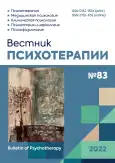Analysis of the degree of adherence to therapy in patients with urolithiasis at the stage of in-hospital treatment
- Authors: Zaitseva D.V.1, Isurina G.L.1
-
Affiliations:
- Saint Petersburg State University
- Issue: No 83 (2022)
- Pages: 40-48
- Section: Medical psychology. Clinical Psycology
- URL: https://journal-vniispk.ru/0132-182X/article/view/310618
- DOI: https://doi.org/10.25016/2782-652X-2022-0-83-40-48
- ID: 310618
Cite item
Full Text
Abstract
Relevance. The problem of adherence to therapy in the clinic of urolithiasis remains insufficiently studied today. Despite the development of new methods of therapy and prevention, the incidence continues to increase not only in Russia, but also in other countries. The problem of re-stone formation is also an important aspect: about 10 % of patients have multiple recurrences, and 50 % of them experience re-stone formation at least once in their lifetime. However, the simplest preventive measures were shown to reduce the recurrence rate to 12 %, but according to studies, less than 50 % of patients follow these recommendations. Intention of the study is to explore the socio-demographic and clinical factors that influence the formation of the degree of adherence to therapy in patients with urolithiasis. Methodology. There were studied 72 patients at the stage of stationary treatment in the clinic of urology of the First St. Petersburg State Medical University n.a. I.P. Pavlov. The sample included 29 male and 43 female patients, aged 40 to 78 years, with average age of 50 years. To analyze the sociodemographic and clinical characteristics of patients, the degree of awareness of the disease, special questionnaires were developed; the questionnaire was also developed to obtain an expert assessment of the degree of adherence to therapy. The questionnaire “Level of compliance” by R.V. Kadyrov was also used. Results and Discussion. The assessment of the degree of adherence to therapy showed that at the stationary stage of therapy, patients have a high and moderate degree of adherence to therapy. Comparison of self-reports of patients with the assessment of adherence to therapy by doctors showed that doctors often give higher ratings than patients themselves. Conclusion. The obtained data should be used in the development of methods aimed at increasing the degree of adherence to therapy for patients with urolithiasis, as well as guidelines for physicians.
About the authors
D. V. Zaitseva
Saint Petersburg State University
Author for correspondence.
Email: dashazaitseva.psy@gmail.com
Сlinical psychologist, PhD Student, Faculty of psychology, Department of Clinical Psychology and Psychophysiology 7–9, Universitetskaya Embankment, St. Petersburg, 199034
G. L. Isurina
Saint Petersburg State University
Email: dashazaitseva.psy@gmail.com
PhD Psychol. Sci. Prof., Department of Clinical Psychology and Psychophysiology 7–9, Universitetskaya Embankment, St. Petersburg, 199034
References
- Apolikhin O.I., Sivkov A.V., Solntseva T.V. [et al.]. Zabolevaemost’ mochekamennoi bolezn’yu v Rossiiskoi Federatsii 2005–2016 gody [Incidence of urolithiasis in the Russian Federation (2005-2016)]. Eksperimental’naya i klinicheskaya urologiya [Experimental & clinical urology]. 2018; (4):4–14. (In Russ.)
- Vasserman L.I, Shchelkova O.Yu. Psikhologicheskaya diagnostika rasstroistv emotsional’noi sfery i lichnosti [Psychological diagnosis of disorders of the emotional sphere and personality]. St. Petersburg. 2014. 408 p. (In Russ.)
- Gadjiev N.K., Vasil’eva A.V., Zaytseva D.V. [et al.]. Primenenie kratkosrochnogo psikhoterapevticheskogo vmeshatel’stva dlya uluchsheniya priverzhennosti terapii patsientov s mochekamennoi bolezn’yu [The implementation of the brief psychotherapeutic intervention to improve adherence to therapy in patients with urolithiasis]. Vestnik urologii [Urology herald]. 2020; 8(3):120–133. doi: 10.21886/2308-6424-2020-8-3-120-133. (In Russ.)
- Gevorgyan A.R. Analiz urologicheskoi zabolevaemosti vzroslogo naseleniya g. Moskvy za 2006–2015 gg. [Analysis of urological morbidity in the adult population of Moscow for the years 2006-2015]. Meditsina v Kuzbasse [Medicine in Kuzbass]. 2017; 16(2):49–54. (In Russ.)
- Kondratyev G.V., Yudin S.A., Vershinin E.G. [et al.]. Biopsikhosotsial’nyi podkhod v meditsine: teoriya i praktika realizatsii [Biopsychosocial approach in medicine: the theory and its practical realization]. Uspekhi sovremennogo estestvoznaniya [Advances in current natural sciences]. 2014; (9):14–16. (In Russ.)
- Lekhtsier V.L. Semiozis bolezni: dikhotomiya kul’turologizma i personalizma (preodolevaya stereotipy biomeditsiny) [Semiozis of illness: dichotomy of “culturologism” and “personalism” (overcoming stereotypes of biomedicine)]. Vestnik Samarskoi gumanitarnoi akademii. Seriya Filosofiya. Filologiya [Bulletin of Samara Humanitarian Academy. Series Philosophy. Philology]. 2009; (2):85–111. (In Russ.)
- Petrov V.I., Razvalyaeva A.V., Nekrasova E.E., Malyuzhinskaya N.V. Otsenka kachestva zhizni patsientov, stradayushchikh khronicheskoi idiopaticheskoi krapivnitsei [Assessment of quality of life of patients suffering from chronic idiopathic urticaria]. Vestnik Volgogradskogo gosudarstvennogo meditsinskogo universiteta [Journal of Volgograd state medical university]. 2010; (4):38–40. (In Russ.)
- Türk C., Knoll T., Petrik A. [et al.]. Guidelines on Urolithiasis. European Association of Urology 2015. 97 p.
- Babwah F., Baksh S., Blake L. [et al.]. The role of gender in compliance and attendance at an outpatient clinic for type 2 diabetes mellitus in Trinidad. Pan American Journal of Public Health. 2006; 19(2):79–84. doi: 10.1590/s1020-49892006000200002.
- Gonzalez J., Tanenbaum M., Commissariat P. Psychosocial factors in medication adherence and diabetes self-management: Implications for research and practice. American Psychologist Journal. 2016; 71(7):539–551. doi: 10.1037/a0040388.
- Jin J., Sklar G.E., Min Sen Oh V. [et al.]. Factors affecting therapeutic compliance: A review from the patient’s perspective. Therapeutics and Clinical Risk Management. 2008; 4(1):269–286. doi: 10.2147/tcrm.s1458.
- Khambati A., Matulewicz R.S., Perru K.T. [et al.]. Factors Associated with Compliance to Increased Fluid Intake and Urine Volume Following Dietary Counseling in First-Time Kidney Stone Patients. Journal of Endourology. 2017; 31(6):605–610. doi: 10.1089/end.2016.0836.
- Manteuffel M., Williams S., Chen W. [et al.]. Influence of patient sex and gender on medication use, adherence, and prescribing alignment with guidelines. Journal of Women’s Health. 2014; 23(2):112–119. doi: 10.1089/jwh.2012.3972.
Supplementary files










